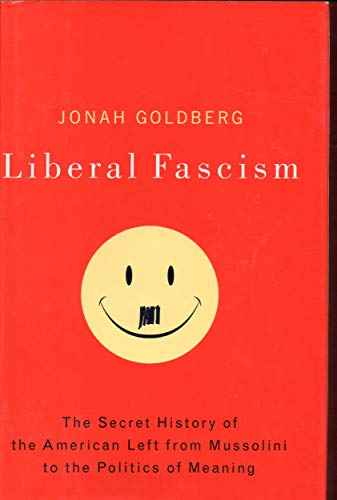Liberal Fascism
The Secret History of the American Left, From Mussolini to the Politics of Meaning
Jonah Goldberg
BOOK REVIEW

In a world where political rhetoric often spirals into chaos, Jonah Goldberg's Liberal Fascism: The Secret History of the American Left, From Mussolini to the Politics of Meaning emerges as a bold manifesto that rattles the chains of conventional ideologies. This powerhouse of a book dives deep into the murky waters of political identity, probing the dark underbelly of liberalism and its historical ties to oppressive regimes. Buckle up as you embark on a journey that challenges everyone's perception of fascism, as it weaves through events and figures that shaped not only American politics but the very fabric of our societal ethos.
Goldberg, armed with a wit sharper than a scalpel and a depth of historical knowledge that would intimidate even the most seasoned scholar, tackles an audacious assertion: that liberalism in America can exhibit characteristics eerily reminiscent of fascism. This is not merely a sensationalist claim; it is a call to arms for nuance in political discourse. Can you feel the weight of that claim? The urgency to scrutinize our political identities becomes palpable, compelling us to peer beyond the surface.
As you turn the pages of this extensive treatise, Goldberg grips you with historical narratives and piercing analysis, entwining the ideological roots of the American Left with figures like Mussolini and the aftermath of world war politics. His exploration isn't merely academic; it has the venom of a political thriller, infused with real urgency and weight. One cannot help but question their own understanding of fascism and liberalism in tandem-are they really opposites, or is it just a mirage?
The book delves into an array of ideologies, forcing readers to confront a discomforting reality. Fascism, often painted with a singular brush of intimidation and violence, appears through Goldberg's lens as possessing a complex connection to popular movements, including those on the left. Does this revelation ignite flames of outrage within you? It should! The revelation can send shockwaves through one's understanding of political alignment, forcing you to reassess where you stand and what that means for both history and future governance.
Critical voices have risen in response to Goldberg's assertions, calling his analysis a mere weapon for partisan politics. Detractors argue that linking liberal ideologies with fascist ones is a slippery slope, a means to undermine progressive movements in favor of conservative agendas. However, as you digest the implications of his arguments, one must consider whether such a juxtaposition serves as a crucial wake-up call rather than mere political defense rhetoric.
Indeed, many readers have found themselves polarized by Goldberg's work. Supporters praise it for its audacity and daring approach, illuminating connections that are often glossed over in standard political discourse. Critics, on the other hand, claim it is overly simplistic and reductive, dismissing nuanced understandings of history in favor of grandiose claims. But isn't there something thrilling about being pushed to confront the uncharted territories of ideology? There's beauty in grappling with discomfort, isn't there?
As you wade through the textual cacophony, the experience transforms into more than mere intellectual exploration; it ventures into a realm of personal revelation. The juxtaposition of liberal ideas and fascist movements invites every reader to introspect on their beliefs, urging a confrontation with the latent biases that influence how we view the political spectrum.
Goldberg doesn't stop at merely drawing parallels; he opens the Pandora's box of moral responsibility. In this age of outrage, when every tweet can spark fires of a new cultural war, how do our collective histories influence our political affiliations? How precarious is the balance between free expression and the descent into authoritarianism? Let these questions reverberate in your mind, demanding answers.
In a rapidly changing political landscape, Liberal Fascism serves as a crucial touchstone. Its influence stretches far beyond academia, shaping debates among thinkers, politicians, and citizens alike. As much as it's a critique of the left, it's also a clarion call for understanding, urging all corners of the political sphere to scrutinize the tendencies that lead to division and upheaval. Can you afford to ignore this? Apathy is not a luxury you can indulge in!
In conclusion, Jonah Goldberg's Liberal Fascism demands your attention-not merely as a historical commentary but as a catalyst for reflection on our present and future. It's a book that will leave you questioning: how do we reconcile our ideological beliefs with the weight of history? The world needs more conversations that peel back the layers of dogma; consider this book your entry point into those critical dialogues. 🌪🔥
📖 Liberal Fascism: The Secret History of the American Left, From Mussolini to the Politics of Meaning
✍ by Jonah Goldberg
🧾 496 pages
2008
#liberal #fascism #secret #history #american #left #from #mussolini #politics #meaning #jonah #goldberg #JonahGoldberg